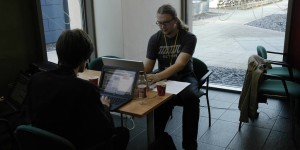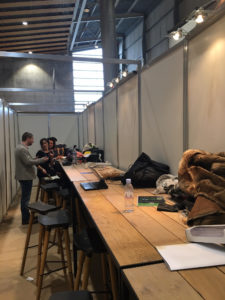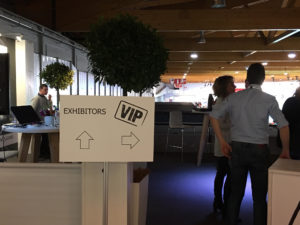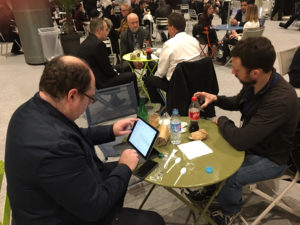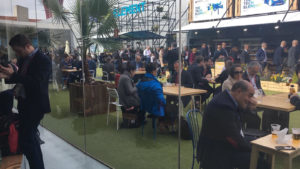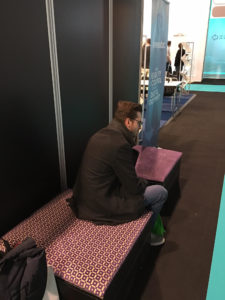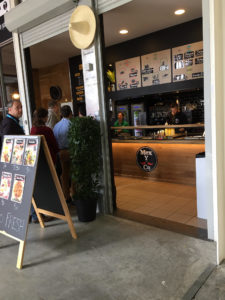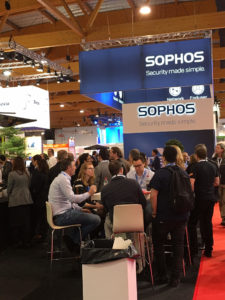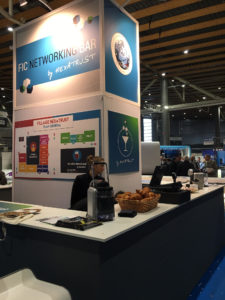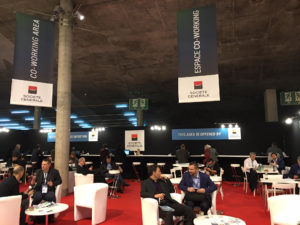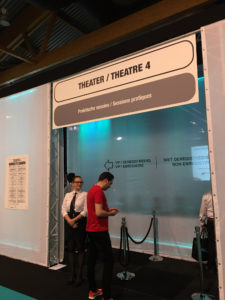To read Part 1 of this two-part series click here
12 August 2017 – Last weekend I was finishing this concluding post on Cannes Lions when … HOT OFF THE PRESS!! … came news of the extraordinarily “ill-timed” leadership shake-up at ILTA as reported by the all-knowing mavens at Legal IT Insider … literally days before the start of ILTACON 2017.
Well, many are calling it “ill-timed” with no official communication going on (other than on social media and comments in private forums) and a comment from one ILTA insider who told me “the personal fiefdoms and bullshit are over” (whatever that means). The comments at the end of the Legal It Insider piece I linked above go both ways, attacking and defending ILTA. And yesterday Rick Hellers (one of the founders of ILTA) published an “open letter” condemning the purge by the new team at ILTA.
So who knows what is going on. But it is so indicative of the legal technology conference market today: turmoil, chaos, re-branding, “what-in-hell-should-we-do-now?!”
So let’s try to unpack some of this and take a long view. Of course, in the end, it could just be Vladimir Putin again.
THE TECHNOLOGY CONFERENCE ECOSYSTEM
My media team and I attend/cover over 35 technology events a year. We have 65,000+ readers across a myriad of technology subjects. We see how technology events can be run, should be run. Besides the 10+ workshops and 1-day educational tech events we attend throughout the year the main conferences we attend are:
- BlackHat / DEFCON in Las Vegas, Nevada
- Cannes Lions in Cannes, France
- CES in Las Vegas, Nevada
- Computational Linguistics (ACL) in Vancouver, Canada
- Computers, Privacy & Data Protection Forum in Brussels, Belgium
- Computational Linguistics (ACL) in Vancouver, Canada
- CyberSecurity Forum in Lille, France
- Digital Investigations Conference (DIC) in Zurich, Switzerland
- DLD Tel Aviv Innovation Festival, in Tel Aviv, Israel
- FIC European Cyber Security Forum in Lille, France
- FireEye Cyber Defense Summit in Las Vegas, Nevada
- Georgetown Law Advanced eDiscovery Institute in Washington, D.C.
- Georgetown Law Cybersecurity Law Institute in Washington, D.C.
- ILTACON
- InfoSecurity in Brussels and London
- International Journalism Festival in Perugia, Italy
- IQPC Corporate Counsel Exchange in Munich, Germany and Amsterdam, The Netherlands
- LegalTech New York
- Mobile World Congress (MWC) in Barcelona, Spain
- Munich Security Conference in Munich, Germany
- RSA Cyber Security Conference in San Francisco, California
- SAP Innovation in Berlin
- Slush in Helsinki, Finland
- Vanity Fair’s New Establishment Summit in Beverly Hills, CA
All of these events attract increasing numbers of CxOs especially general counsel and corporate legal directors. There is the opportunity to network and develop business and set up “your pitch” to develop further follow-up, especially e-discovery work since few e-discovery vendors attend these events although that is changing. Those e-discovery vendors thinking outside the box are growing in number at these events. Over the last 4 years I have picked up 5 e-discovery projects by attending/networking these events.
BUT THE KEY IS WHAT YOU’LL LEARN OUTSIDE THAT INFERNAL LEGAL TECHNOLOGY CONFERENCE BUBBLE. For instance (and I am just cherry picking a few items across my vast conference landscape):
- At Cannes Lions and IJF I learned about “narrative science for lawyers”, how the tsunami of data and information we deal with as lawyers gets divorced from context. Data only tells part of the story. Understanding data requires real world expertise. It requires a narrative. And there are visual and analytic tools to use.
- At MWC I first learned about mobile device forensics, that branch of digital forensics relating to the recovery of digital evidence or data from a mobile device.
- At DLD Tel Aviv and DIC I learned how Google’s DeepMind is marching out an algorithm that can summarize documents and use machine-learning to produce and connect coherent and accurate snippets of text from other documents in a database.
- At MWC, IQPC and InfoSec we learned how Ravel, using data viz and machine learning, using visual search, can help craft “argument–cases”.
- At RSA we learned how metadata can be “scrubbed” and/or changed … something the Chinese cyber sleuths have turned into an art form if you have been following the recent cyber news.
- At RSA, MWC and Slush we learned how corporations use intranets to avoid email chat trails. We used that information to assist an EU corporation in an e-discovery internal investigation of price fixing and other dubious activities by its marketing/sales staff in preparation for an expected government regulatory crackdown that had already embroiled some of their competitors.
- At MWC and RSA we first learned about “splinternet”, the break up of the world wide web as we know it. Due to the ever tightening control the net by multiple governments, regional content blocking, the need for companies to comply with diverse, often conflicting national policies, regulations and court decisions, many search engines cannot access Facebook, Google, news sites like The Economist and the New York Times, etc. I have learned this first hand through my travels in the Middle East. So someone’s experience of the internet in China or Israel or Turkey, for example, will be increasingly different from their experience of the internet in Australia.
- At MWC, the Georgetown Law conferences and at RSA we learned about the increasing use of fake cell towers across the U.S. by law enforcement … and also foreign intelligence operations … to scoop up all cell phone traffic in a targeted area.
- At Cannes Lions we learned how Ogilvy UK (a client of mine) assisted the UCL Forensics Lab in London to show how many criminal cases could be using incorrectly interpreted evidence via an artificial intelligence program to reach a verdict.
- At both MWC and RSA I attended workshops that provided my grounding in the overall framework of cyber security, government data collection, and what “full visibility into all data” means at various security, e-discovery, and data analysis levels.
- Last week at a FireEye workshop my team learned how hackers are now using the exploit behind WannaCry to snoop on hotel Wi-Fi systems across Europe to steal data from some very high-profile hotel guests.
- And we learn about fun stuff. One cool bit I learned last year at MWC from a chap who was with the United States Cyber Command (granted, a highly sanitized version of his normal background brief) : every morning the Pentagon must clear 65,000 people through various entrances, all within 3 hours. The example was used in describing the various levels of cyber security/identity verification a corporation can employ, when and where they are needed, etc. At the Pentagon “front door” you are not going to do a badge check-fingerprint check-retina check on everybody and get those 65,000 people through the gates in 3 hours. It is a “layered” process and security passes have multiple embeds depending on where you work in the Pentagon. And yes, James Mattis, the current Secretary of Defense, has his own very special security badge unique to him.
I’ll stop. You get the drift.
LESSONS FOR THE LEGAL TECH CONFERENCE WORLD
LegalTech and ILTACON are the smallest technology events we cover. I use them as training opportunities for my staff so they can cover the larger events. For the average attendee, LegalTech can be covered in a day and a half … and increasingly, that has been the duration for most attendees. (ILTACON is a wee bit different as I note below).
The points I want to make are simple:
- If the only technology events you attend are legal technology events (and that includes e-discovery events) then you’ve robbed yourself of the opportunity to attend events that demonstrate how technology events should be run.
- Given the extraordinary recent technological innovations … in particular, the explosion in information volumes along with the computing power and analytics applications now available … you need to expand your horizons and attend real technology events or otherwise you’ll miss out on the truly outstanding technology out there that will effect, does effect the legal technology market.
- And if you are a vendor you are missing out on opportunities to network and pitch your wares to interested parties at venues beyond the “usual suspects”.
- The thing that keeps folks coming back to events is the event organizer’s focus on the “people factor” – making sure to satisfy what vendors, attendees and sponsors all expect and want. Satisfying everybody. I think legal technology conferences have lost the plot, have forgotten that people factor. Two brilliant exceptions to that rule: the Yerra Solutions conferences, and the ING3NIOUS retreats and workshops. That’s why I think the other legal technology events are in turmoil and decline. The events I listed above have never lost that “people factor” which is why they experience record attendance and kudos year-after-year-after-year.
I think points #2 and #3 are the most important. As I have noted in previous posts, the many corporate counsel I have met at the events listed below know about and/or have seen the ever more powerful analytical technology in the enterprise technology marketplace … more powerful, easier to use, more accessible and requiring less human capital … and they see a disconnect on what is on offer at the e-discovery technology venues vis-a-vis what their corporations are using in-house. It is why they attend some many other technology events and not the “usual suspects”.
NOTE: in September I will explain that in more detail in the final part of my series on the legal industry, the growing movement by corporations to bring e-discovery back in house. For Parts 1 and 2 click here.
That is why I am seeing more and more EDD vendors spreading their wings and networking elsewhere. Not necessarily abandoning LegalTech and ILTACON but going to events in addition to those two venues.
My starting focus has been the Cannes Lions International Festival of Creativity (its full name) because it is my favorite event of the year along with the Mobile World Congress. And it’s more than just Cannes being an advertising conference as famous for its rosé-soaked yacht parties as its agenda-setting discussions and deals. This year, there was a widespread feeling that the industry has been slow to adapt to the turbulent global economy, buffeted by the advances of social media in areas normally reserved for the mainstream advertising players. I had the most intense discussions on how GAFA … Google, Amazon, Facebook, Apple … have become entrenched monopolies and have created remarkable franchises that have created vistas of wealth creation from ad-related search to online retail, IT platforms, media, social interaction, entertainment and devices. We have surrendered our culture to them.
NOTE: GAFA is the acronym for Google, Apple, Facebook, and Amazon – the 4 most powerful American technology companies. Usage of the term “GAFA” is increasingly common in Europe. The acronym was originally used in France in tax case but now it is widely used by both EU and US antitrust lawyers and the legal media to identify the 4 companies as a group, often in the context of legal investigations.
I am writing a detailed briefing paper on the many aspects of GAFA and monopolies and how they came about, on behalf of a long-time client which is a microeconomics consultancy that provides economics advice to public and private sector clients on matters of competition policy, public policy, regulation, business strategy and behavioral economics. It will be published in September. The first chapter … what they call the “teaser” chapter … will be published next week.
As I thought about Cannes Lions I thought about the legal technology conference industry, how many of their concerns are similar to those in the legal industry. There was talk in Cannes this year about irrelevancy, how GAFA now “owns” the industry (read Part 1 of this series to get the broad strokes). But as I was reviewing my interviews from this year’s event I came across numerous attendees and presenters who said talk about irrelevancy is wrong because the event keeps getting bigger, tech companies and consultancies keep raising their stakes — and the clients keep flooding the Riviera. Jason DeLand, a partner at Anomaly (a major player in the media industry; you know many of the media campaigns; one of the first agencies to use a multi-media approach, and charges by performance, not by hour) nailed it:
At its worst, Cannes Lions is a boondoggle. Somewhere in the middle it’s a great place. Because on its face, you can’t argue that Cannes is irrelevant. The better question is, what role does it play credibly in an industry that is defined by much more than simply creative excellence. Because the technology and the new movers are killing the old birds. But the organizers are trying, they are adapting. They are responsive to the audience: client, attendee. Because Cannes Lions is still a great place to connect and network and probably at the very top end it’s a place to learn and get inspired. And market. Because we are a people industry and these organizers know the people factor.
And just one tiny example I had described in Part 1 of this series. Over the last three years IBM had a 3-person delegation running a small cabana on the beach behind the Palais.This year they operated a huge beach space that hosted panel discussions and “experiences” with Watson artificial intelligence, direct-to-industry applications, etc. They realized the marketing opportunity. I am not enamored with Watson (long story) but I must say they did fabulous presentations. And it begs the question “so why not the same at LegalTech?”
But … BANG!! … Jason DeLand gets it. The people factor. I do not know what brought on the pubic execution of Peggy Wechsler and the Gang of Four at ILTACON (or is it ILTA CON?). But I do know the “people factor” has been dying a slow death in the legal tech conference industry, exceptions noted above.
LET’S TALK ABOUT THE BIG GORILLA, THE MONEY … OR THE LACK THEREOF
The first thing that struck me in Rick Heller’s “open letter” to ILTA’s Board (linked above) was his focus on the rampant trend toward commercialism and vendor “cash cows”. I do not know Rick, I do not his history behind/with ILTA, or even the guiding philosophy behind ILTA. But in a world where the only thing, everything is money, and everything must have a cash value I am certainly not surprised if the “new” ILTA has $$$ in its eyes. That has been the case at LegalTech for years.
NOTE: and not to digress, but it starts at the very top of the legal profession. To steal a little thunder from my upcoming briefing paper on the vapid employment of antitrust to block the tech oligarchs’ domination of key markets, note this point on DoJ enforcement. Years ago the U.S. Justice Department moved away from trying to get jail time for corporate criminal conduct and just went for getting large fines and settlements, with a few exceptions. In my upcoming brief I will go into the “whys and wherefores'” in more detail and how it affects antitrust enforcement. But suffice it to say that what we have is a “pas de deux” between prosecutors and corporations. The DoJ routinely “up charges” crimes, requesting maximal prison sentences to threaten defendants with Draconian sentences if they refuse to plead guilty or settle. As one lawyer who does corporate criminal law told me “it’s brilliant – you penalize people who have the nerve to go to trial.” Another told me such prosecutorial bullying violates the Sixth Amendment right to a trial by jury. But as he said “who cares. for most Americans, this constitutional right is a myth, as has happened to so many constitutional rights”.
Because money is the weak link in legal tech. And the reason is simple. Yes, the e-discovery market is estimated to grow to $8 billion in 2017 and maybe $22 billion by 2021. Wow.
But look around the e-discovery ecosystem, especially the key players. These are “Mom & Pop” companies, many backed by venture capital and private equity partners … with shoe string marketing budgets. Many are not backed by any money but their own resources.
As I laid out it Part 1 of this series, it’s worth knowing just how expensive it is for a company to be in Cannes Lions. It can cost €1 million ($1.1 million) before an ad agency even gets on a plane. And based on a quick canvass of a number of the marketing staffers in attendance, it costs agencies roughly a minimum of $8,000 to $10,000 to send one person to Cannes, and obviously the price tag can grow way beyond that depending on food and entertainment spending.
NOTE: at the Mobile World Congress the average vendor spends $250,000 … and that’s before any per diem charges are calculated. Google builds its own multi-level conference center inside the main conference center. With a waterfall. And many of the other tech events I noted above are similar in cost for vendors.
In Cannes, add to this vendors like WPP, Publicis, Facebook, IBM, etc.,etc. who run non-stop foot and liquor bars for attendees … and we’re talking serious money. But listen: it keeps them at the vendor booths.
Because at the end of the day the e-discovery technology ecosystem is a cottage industry. It does not generate anywhere near the cash flow the other technology ecosystems do so it does not merit the expenses incurred by these technology mavens. The most you can hope for at ILTACON or LegalTech is an invite to a vendor’s sole pizza night or drinks night. The most embarrassing Tweets last year at LegalTech were the plaintive cries from exhibit hall attendees “does anybody know where I can find food up here?” … with the response “hey, Vendor X has a few bags of crisps and a few bottles of water”.
And to be frank, as many vendors told me, the problem with Mom & Pop ediscovery outfits is that for those without any VC capital invested in them, they are living from hand to mouth and LegalTech is probably their only marketing punt of the year. I get that.
But this is much more than being able to afford a pizza night. The e-discovery venues inhibit holding a proper technology forum. And even if we accept the lack of money surely there is a better way. So let’s move on …
LEGALTECH aka LEGALWEEK …. AND ILTACON
As regards LegalTech, I have always had a problem with a legal technology show being hosted in a venue that later in the year will host the “beads, baubbles and baskets” show and the “baseball card trading” show. But that might be because all the other technology events I attend are at professional convention centers.
ILTACON at least is always at a member of the Gaylord Hotel chain which are more pleasant surroundings. In general, ILTA, is a peer group – notwithstanding its recent St. Bartholomew’s Day massacre. So it is not a business like LegalTech, although Rick Hellers would beg to differ. So ILTACON puts on a far better show in terms of content, sponsor involvement and opportunities (for instance, there is an exhibitor hall “kickoff”, where sponsors have an opportunity to mingle with attendees for two hours), facilities, etc. It also tends to be more focused because many of the attendees have the same background (law firm IT), compared to LegalTech which has a smorgasbord of different tracks and panel topics and attendees. I have to believe LegalTech’s emphasis is on exhibitors and getting people to walk the exhibition halls. There is more money there than in the educational sessions.
Does it cost you to speak at a session or moderate a panel? At LegalTech, yes. I have been quoted $7,500. At ILTACON, there is also a charge but maybe not explicitly. Sponsors told me they can get first dibs on those speaking spots. For LegalTech, the emphasis has always been on exhibitors, getting people to walk the exhibition halls. There is more money there than in educational sessions.
But as I note below, educational sessions can be a big draw … if they are run people foremost in their field who are incredibly passionate about what they do. Otherwise you get lackluster sessions.
NOTE: a number of years ago the organizers contemplated moving LegalTech to the Javits Center, a huge proper convention center on the West side of New York. But the costs were prohibitive. A friend passed me the internal memo detailing the costs and said “listen, vendors puke over the cost of The Hilton. The Javits Center? fugetaboutit!!”
And even though the LegalTech organizers struck a special deal with The Hilton … or so I am told … things do cost money. So LegalTech decided to begin charging a fee for even the most basic admission, and everybody available space needs to be sold. Attendance at the general keynotes, several sessions, and the admission to the exhibit hall used to be free, and now it appears there is a fee even for admission to the exhibit hall. This has certainly discouraged attendance.
NOTE: but a few “notables” are getting into the exhibit hall. Last year my film crew followed an elderly couple around the exhibit hall … they were guests at The Hilton … who somehow got passes (they would not say how) and were scooping pens, mouse pads, soft toys (“oh, perfect for the grandkids!!”) into a vendor tote bag so at least somebody was having fun.
Also, LegalTech West, which several of my legal vendor clients attended, said that probably less than 500 non-vendor attendees showed up (the prospectus they were given estimated 2,000) and most of them will not attend next year. Several vendors said “I would be very surprised if it exists a year from now”.
One star in the e-discovery firmament (who participates in LegalTech, ILTACON and the Georgetown Law e-discovery events sums it up this way:
LegalTech serves a purpose. It’s for the great unwashed, the new people who know zip about e-discovery. They get to see all the kinds of legal tech out there, together, all in one place. Think of it as a carnival. And many of us just use the event to catch up with fellow colleagues, and hopefully some customers or prospective customers. The educational sessions … eh, there are just basic. Not like ILTA and no where near the advanced level of Georgetown sessions where the serious e-discovery practitioners go. No new things at LT, no new ground is going to be plowed. Just version 10.1.2.3.4.5 of the current software. Yes, it could be better. But the emphasis is on exhibitors … more money there … and that beats out the educational sessions.
That’s a big point on the educational sessions. Since they are up for sale, you do not necessarily get the industry leaders. So you have all of these vendors putting on their own sessions off site sessions at the scores of hotels and other venues around the Hilton.
Before I detail what other technology events do and make suggestions for legal technology events, some of the common complaints as told to me by multiple vendors:
- Why is LegalTech in the dead of winter, in the most expensive city in the U.S.? Surely a more receptive clime, a cheaper clime would help everybody concerned.
- We need a press section where media can meet with vendors off the floor, away from the noise. (NOTE: every event I attend has one. See photos below. They are a great boon to vendors).
- We need some food and drink stands in the event. Why are we driven off-premises to grab even a quick bite? (NOTE: I have been told conflicting stories. LegalTech personnel tell me The Hilton prohibits that because it competes against their food facilities; The Hilton marketing people tell me “that’s nonsense”. And another LegalTech insider told me they make more money selling a space to a vendor rather than a food cart.)
- Reconfigure the event so the educational session venues are “merged” with the exhibit hall. Blend them. (NOTE: I suspect that is impossible at The Hilton. But common at a normal convention center).
- More places to sit for short meetings and to recharge mobiles. (NOTE: easily done; see photos below).
- One recurring comment: given the growing focus on all elements of data analytics, how about an event with that sole focus and only vendors in that sphere? I really don’t need to know about automatic contract generation, teleconferencing, etc. and trolling the exhibit hall looking for the vendors I need (NOTE: these events already exist)
- Put the vendor demonstrations next to/near the vendor booth. Why do I need to schlep down 3 sets of escalators, out the door, and find the vendor’s hotel?! (NOTE: done at all other tech conferences; impossible The Hilton).
NOW … HOW I THINK A CONFERENCE CAN BE RUN THE RIGHT WAY
The “people factor”: keep people engaged, keep them at the event, service all of the players
The following photos: sections of the press areas at FIC, InfoSec, RSA, MWC. Free coffee/soda and finger sandwiches.There are sections to conduct interviews. They are normally located on permitter of the exhibit hall.
The following photos : common at most conferences. A separate place for exhibitor staff to eat and relax,
and a VIP areas for vendors willing pay a bit extra to host a customer for a coffee, chat,
whatever. Normally located close to the exhibitor hall. The larger venues (the last three photos)
scatter eating venues throughout the conference area.
The following: a bench at the FIC event, but similar to every event we attend. These are scattered throughout
the venue. Not shown but behind each bench is a power outlet for recharging your phone, tablet, whatever.
The following: FIC, InfoSec and RSA have several exhibit halls connected by hallways.
In each hallway there re 4-5 food kiosks such as this one.
The following: almost every vendor has a basic coffee/water bar and/or food bar with tables to sit
and chat with prospective customers. What is becoming popular: co-working areas (last photo)
The following: rather than separate the educational sessions and vendor presentation area almost every event circles them around the exhibit hall (and vendors can pay extra to make sure a theatre is in close proximity to its booth)
The following: this was shot at InfoSec but I have seen them in the U.S.
Smaller venues have these “meals on wheels” located
throughout the venue.
CONCLUSION
The message is not whether or not ILTACON and LegalTech are dead but that the world has moved on and both of these tech conferences need to get out into the wider world. As noted in the beginning, given the extraordinary recent technological innovations … in particular, the explosion in information volumes along with the computing power and analytics applications now available … these events need to expand its horizons and incorporate the truly outstanding technology out there that will effect, does effect the legal technology market. But more importantly: law firms, corporate counsel and legal technology vendors need to break away from their safe, cloistered view of the market.
The Georgetown Law Advanced eDiscovery event evolves EVERY year, adapting to their audience, the market, the players. Please read my post on why this event has become the “must attend” e-discovery event (click here).


